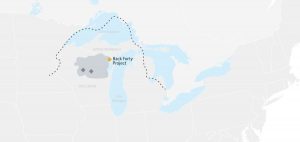EPA not happy with Canadian miner's zinc-gold project in Michigan
The U.S. Environmental Protection Agency sent a letter to the Michigan Department of Environmental Quality saying it was objecting to the state's wetlands permit for the Back Forty open-pit mine, located in the southern part of Michigan's Upper Peninsula along the Menominee River.
The zinc, copper and gold project is being proposed by Toronto-based Aquila Resources (TSX: AQA) and it contemplates mining 16.1Mt of mineralized material over the 16-year life of mine, of which 12.5Mt is open-pit and 3.6Mt is underground.
However, according to the missive signed by Christopher Korleski, the EPA Water Division director, Aquila's project does not comply with federal Clean Water Act guidelines. At the same time, he says the company failed to provide a complete description of the project, including a final site plan showing the final location of key features of the project, a proposed power plant, planned underground mining facilities, and stormwater and mining water management facilities.
Korleski also says that the miner's application lacks relevant information on the stability and integrity of the mine pit to be located on a bluff above the Menominee River, including an analysis of slope stability and erosion of the river bank. It also fails, in his view, to show how the project "will not adversely affect water quality of the Menominee River but does not explain how the project will be managed to ensure discharges will meet water quality standards, including sufficient monitoring locations, minimization measures, and adaptive management procedures to prevent leaching of toxic compounds from mine storage facilities and from the mine pit into the River."
The letter states that the company also failed to provide information regarding the extent of wetlands that will be impacted by the project and how these wetlands will be affected by the proposed project's Menominee River drawdown of some 125,000 gallons per day.


Aquila, on the other hand, responded through a press release saying that it "has taken great care to design a project that meets and exceeds applicable environmental standards and is committed to ensuring that the Back Forty Project is a safe, disciplined operation that promotes and supports local community socio-economic development and is protective of the environment."
The mine also happens to be near the Wisconsin border, not far from the city of Marinette. This closeness is also a cause of concern for the EPA. In the letter, the agency's director notes that Michigan has not fully addressed the issues presented in a lawsuit by the Menominee Indian Tribe of Wisconsin, whose members are worried about damages to their hunting, fishing and gathering heritage in the area.
"The applicant has not provided sufficient information to support the assertion that the proposed project would likely not impact potentially eligible resources. Historical and cultural resources should be addressed for the entire expanded project site," the communication reads.
Both the Michigan Department of Environmental Quality and the miner have 90 days to respond to the federal regulators. If the issue is not settled by then, the Corps of Engineers could assume responsibility for the wetland permit and issues, taking it away from the state.
However, Aquila seems to want to continue working at the state level. "The company is confident that it can work with the MDEQ within the prescribed timeframe to provide the additional information requested by the EPA," its media statement says.
Aquila also has to work on a series of questions the same state agency sent earlier in March. The questions are based on 3,420 public comments received on the wetland application by the DEQ's Water Resources Division and the deadline to reply is March 23, 2018.